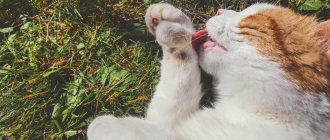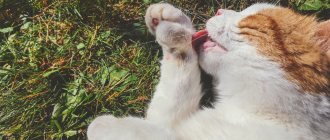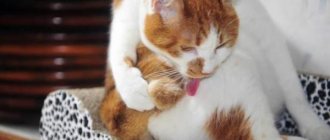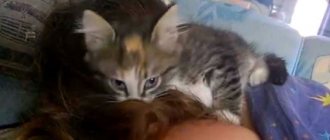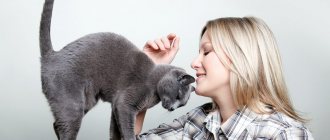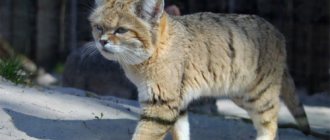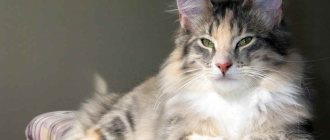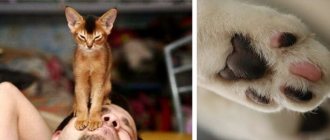A dog licking your hand is normal. This is how they show affection. However, with a cat it is a completely different matter. These felines aren't exactly known for their licking, so it's a little strange when they start licking our hands and fingers a lot.
Luckily, this is fairly harmless behavior. This is usually a sign of affection, although it can mean other things. Let's look at some of the most common reasons why this behavior occurs, and what you can do about it.
Social connection
When two cats like each other, they often exchange licks. This usually happens through grooming, but this is not always the case. For example, mother cats lick their kittens, which helps create a social bond. This is a cat's natural reaction to liking someone.
However, such licking is not only allowed for pet owners. Many cats will also lick other animals and felines in the house, especially if they love to lick.
© shutterstock
Some cats love to lick more than others. Just because a cat doesn't lick doesn't mean it doesn't like you. It seems to be mostly a personal thing: some cats lick a lot, while others don't lick at all.
False maternal care
The first emotion a newborn kitten receives is maternal affection. Being blind and deaf, he feels a connection with his mother through tactile touches and then carries these feelings throughout his life. The cat, in turn, licks the kittens' bellies, pursuing other goals - it stimulates digestion and at the same time calms the babies, helping them relax and fall asleep. When a kitten is separated from its mother very early, it instinctively reaches out to a person, transferring its desire for love and care into adulthood.
Animals become especially vulnerable during puberty. If a cat is not sterilized on time and does not give birth, she may develop a so-called false pregnancy. If there is a close attachment to the owner, she has no choice but to “practice” her maternal instincts on a person. Hormonal imbalances often occur in non-castrated cats, which also begin to behave overly affectionately.
Important: in order not to provoke hormonal imbalance and subsequent health problems in your pets, it is advisable to carry out the procedure of sterilization or castration before the age of one year.
Stress
Some cats also lick their hands when they are stressed. It looks like a nerve tick. Your cat may begin to lick excessively, including your fingers. This behavior can also cause your cat to overgroom itself, which basically involves licking a part of its body so much that it begins to lose hair. They may also lick objects such as the floor or sleeping area.
Stress is not always a sign of something serious. Cats experience stress for a variety of reasons. Perhaps your daily routine has changed and this is making your cats nervous. However, sometimes cats can become stressed due to illness. They usually hide their symptoms very well, so you probably won't even know that anything is wrong.
If you notice that your cat is licking his hands too much, keep an eye out for other strange behaviors too. They could indicate that something more serious is going on.
How to rid a cat of the obsessive desire to lick its owner
If hand licking is not associated with pathology, but is caused by the cat’s excessive love for humans, then experts advise doing the following:
- Buy toys for your animal that will attract his attention. These can be either mechanical devices or simple ones, like a fur mouse or a plastic ball with a bell inside.
- Buy catnip at the pharmacy. It is considered a good way to calm an adult cat that is under stress.
- Temporarily do not pick up the animal, but do not drive it away or beat it. When the cat jumps onto the owner’s lap, you need to move him, get up and leave. Gradually, the cat will lose interest in the owner and find a new activity.
- If a cat is undergoing rehabilitation after some illness, but still licks a person’s hands, you should massage his neck or the area along his back. This will relieve tension, calm him down and eliminate the need to lick his lips.
Cats don't just lick themselves to remove dirt. So they massage the glands that secrete a water-repellent oily liquid, and then spread it over the hair with their tongue.
Your hands taste like food
If you've just eaten, your cat may still be able to taste the food on your hands. This may lead to the feline licking your hands simply because they taste good. You can usually tell whether this is the cause of your cat's behavior based on the circumstances.
Even cats that don't seem to engage in social activities will lick your fingers because they taste good.
© shutterstock
Allow or stop
There are different opinions regarding how to treat pets’ attempts to get closer to their owners in their own “animal” manner:
- Certificate "for" . If the animal is healthy, then licking a person's hands is harmless and demonstrates an emotional connection with the owner. By pushing a pet away from oneself or interrupting the manipulation with a rude shout, a person risks offending the pet, who is pouring out his most tender feelings.
- Evidence against . A domestic cat that is not treated for external and internal parasites, as well as stray animals, can be a source of the spread of dangerous diseases and helminths. For prevention purposes, it is necessary to follow the schedule of vaccinations and other sanitary measures when keeping animals.
How to wean it off? Perhaps someone is uncomfortable with a cat's tongue touching bare skin, or the personal hygiene code is too strict. In these cases, it is recommended to switch the animal’s attention from obsessive kisses to play or treats. Catnip is used as a scent lure and a mild sedative.
Popular wisdom warns against offending cats, which, according to legend, are associated with brownies. According to signs, if Murka licks his right hand, wealth and good luck await the person, and a “marathon” of the face and hair predicts a love date.
Source
Hands taste like something else
Even if you haven't eaten anything tasty, your cat may like the taste of something on your hands. This may include lotion and soap, which some cats enjoy. Soap and lotion are usually made from animal fats. Those with higher numbers may be more prone to licking.
Of course, cats tend to only like certain soaps and lotions. Not every soap or lotion will suit everyone. Thus, it is not uncommon for a cat to lick your fingers only after you have applied a certain lotion or soap. They like one and not the other.
Disease
Often, in this way, cats ask for help or show a person that there is a problem that requires his urgent intervention. Indeed, by licking, cats are distracted from pain. If such actions are accompanied by chewing of hair, then there is a reason to visit a veterinary clinic. Often similar actions are typical for cats with false pregnancy. This condition is very dangerous for the animal. Therefore, if the licking becomes persistent, immediately show your pet to a doctor.
Attention
Some cats may lick their hands to get attention. Usually it's just one click. Then your cat will sit back and stare at you. This usually means they want to be petted or held. However, it could also mean that they need you for something else, such as opening the door or refilling their food dish.
© shutterstock
This licking is clearly different from other types. In most other cases, the cat is going to lick you several times. However, licking when they want attention is only a means to an end, so they will stop licking when they get what they want.
To maintain cleanliness
Self-licking is a natural and very common mechanism for caring for one's own body in the animal kingdom.
Kittens begin to lick themselves from the age of four weeks, and before that, all manipulations regarding the infant toilet are performed by the parent.
Cat licking rituals like these are a demonstration of love for cleanliness:
- The cleanest . Sometimes it seems that keeping oneself clean is the main task of a feline brother. Taking the most graceful poses, Murka licks herself for hours, touchingly washes her face with her paws and rubs her ears. She does this many times a day: after sleeping, feeding, taking care of her natural needs, and even stroking her. A cat's tongue, covered with miniature hooks and therefore rough to the touch, combs and arranges hairs like a brush, removing dirt and foreign odors. During this massage, blood flow is stimulated and the skin glands intensify the production of an oily secretion, which lubricates the hair and protects it from moisture.
- “No” to foreign odors . The desire to lick a person may be motivated by the desire to destroy unusual scent marks. According to the cat's understanding, all perfumes, including perfumes, soaps, shampoos and creams, have unnatural and even unpleasant odors, which must be urgently gotten rid of. This is why the cat spends so much time and carefully licking its own area of the body with medicinal ointment applied to it.
- Tempting aromas . Some cosmetics, on the contrary, can be very attractive to mustachios. Such, for example, is a hand and nail cream with an extract of medicinal valerian, which has a magical effect on cats and activates the owner’s obsessive licking. Some cats love the smell of peony tincture and therefore tend to lick the hands or lips of a person who has taken this sedative. Cats are also attracted to human sweat, which contains odorous substances similar to animal pheromones. So the owner, returning from a morning jog or after a hard work shift, smells very attractive to the murka.
Aromatic labeling
A cat can mark something in many ways, their tongue is one of them. Typically, when two cats groom each other, their scents mix. They "tag" each other in the process, and now they both smell like each other.
Your cat may try to recreate this mixture of smells when grooming you. This reason is difficult to distinguish from attachment, mainly because odors usually come from the attachment site as well. Your cat may also knead you, which helps mix your flavors.
Either way, it's mostly a result of your cat licking their hands, although they may act a little differently than you're used to.
Article Author: Kristin Hitchcock Kristin is passionate about helping pet parents create fulfilling lives with their pets by keeping them informed about the latest scientific research and helping them choose the best foods for their pets.
Non-Dangerous Reasons for Unusual Behavior
Non-dangerous reasons are explained by various instincts and characteristics of cat behavior. They are not dangerous and do not require adjustment. Making changes in such situations is a purely voluntary matter, so start from your own feelings.
Influence of instinct
From early childhood, kittens get used to asking for food by licking the mother cat's face. After entering a human family, it is replaced by the hands of its owner.
The act of licking is often repeated after lunch. In this case, the animal simply thanks you for the delicious food and expresses its gratitude.
A way to communicate and attract attention
In addition to hearing and voice, animals use smell and tactile sensations to communicate. With their sensitive tongue, they read information about new acquaintances and learn about the mood of their owners.
Obsessive hand licking may also indicate attention deficit. If your pet is often left alone, then in this way he is trying to attract you to play games together - or to watch a series in a hug.
Cleanliness, influence of odors
Cats are the cleanest animals. They are extremely sensitive to odors and always lick the hands of their owners, trying to eliminate the unpleasant aroma.
The opposite situation is also possible. If the smell is pleasant, the pet will lick the person for pleasure. Most often, cats are attracted to the taste of sweat and certain creams.
Compassion or treatment of a person
Empathic cats acutely perceive any experiences of their owners. By licking a person, they try to calm and encourage him. They do the same when they detect wounds or diseased areas.
Demonstration of superiority or leadership
Unlike dogs, cats either accept the role of equal partners or put themselves at the head of the house. In the latter case, licking is explained by condescension towards the nurse and emphasizing one’s own status.
